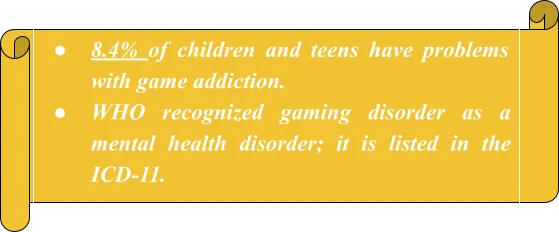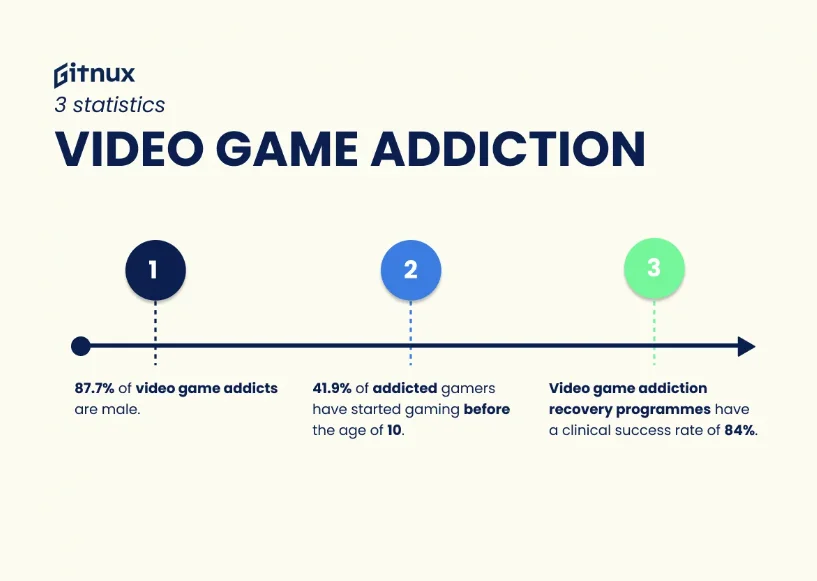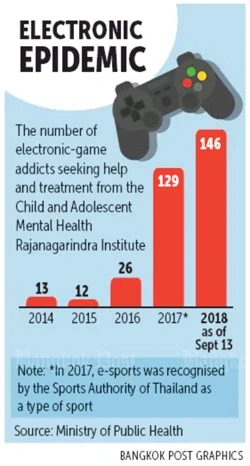
Update: This article was last updated on 9th December 2024 to reflect the accuracy and up-to-date information on the page.
We all know that playing video games can be addictive. When children are unable to focus on any other activities, cannot control the urge to play games, and end up spending the majority of their waking hours playing video games, they are often called addicts. Reportedly, 8.4% of children and teens have problems with game addiction.

According to a recent study, children as young as eight years can develop a gaming addiction. The average age of a gaming addict is 24 years old and a report from 2020 states that between 64% to 66% of the general American population play video games to some extent.

Dangers of Gaming Addiction
- The World Health Organization has recognized gaming disorder as a mental health disorder, and it is listed in the ICD-11.
- More than 85% of commercially available video games feature violent or objectionable material that encourages aggression, drug and alcohol abuse, criminal activity, disdain for authority, violence against women, racial slurs, profanity, and obscene gestures.
- Video games promote immoral behavior, thereby encouraging players to dismiss immoral thoughts as unimportant.
- According to a Taiwanese study, children and teenagers who are heavily addicted to video games typically perform worse in school and are more aggressive.
- The effects of gaming addiction on relationships, jobs, school, mental and physical health, and other areas can be severe.
- Young children who are hooked on to video games may have food and sleep issues and social isolation.
- 7. Additionally, an addiction to gaming can affect concentration and memory.

Important Tips to Prevent Gaming Addiction in Young Children
1. Set limits on gaming time
Like any other activity, it’s important to set limits on how much time your child can spend playing video games. This will help ensure they don’t become too engrossed in the game and start neglecting other important aspects of their life.
2. Encourage other hobbies and activities
In addition to setting limits on gaming time, it’s also important to encourage your child to pursue other hobbies and activities. This will help them stay well-rounded and avoid becoming obsessed with video games.
3. Monitor game content
Some video games can be violent or contain gore graphics. It’s important to monitor the game content your child is exposed to and ensure that it’s appropriate for their age group.
4. Be involved in your child’s gaming activities
One of the best ways to prevent gaming addiction is simply being involved in your child’s gaming activities. Play video games, watch them play, and talk to them about their actions. This will help you better understand their interests and habits, and you’ll be able to provide more guidance if needed.
You should do the same if you want your child to limit their screen time. Show them that you can enjoy other activities without needing to be glued to a screen.
5. Talk to your child about gaming addiction and its dangers
Explain why you think it’s important to limit screen time, and let them know that you’re there for them if they ever feel like they’re struggling with an addiction.
6. Know the difference
The only way you as a parent can help your child get away from video game addiction is by knowing the difference between addiction and normal gaming habits.
Understanding the Difference Between Healthy Gaming and Addiction
When addressing how to stop gaming addiction, it’s essential to distinguish between everyday gaming habits and addiction. Recognizing the difference allows parents to take proactive steps before gaming spirals out of control.
What Constitutes Normal Gaming Habits?
- Balanced Time Allocation: Normal gaming involves playing for enjoyment while maintaining a healthy balance with other activities like school, sports, and family time. For example, limiting gaming to 1-2 hours a day on weekends is generally considered moderate for children.
- Social Engagement: Healthy gamers often use gaming to connect with friends, collaborating on multiplayer games while still participating in offline social activities.
- No Interference with Responsibilities: A child with everyday gaming habits completes homework, chores, and other responsibilities without gaming becoming a distraction.
Red Flags Indicating Gaming Addiction
Understanding how to stop gaming addiction begins with identifying warning signs. Being aware of these behaviors empowers parents to take action.
Preoccupation with Gaming
The child constantly talks about gaming or shows signs of distress when not playing.
Neglect of Daily Activities
Gaming takes precedence over schoolwork, meals, or hygiene.
Emotional Outbursts
The child becomes irritable or angry when asked to stop gaming or when their screen time is limited.
Loss of Interest in Other Hobbies
They stop participating in activities they once enjoyed, such as sports or art.
Physical Symptoms
Lack of sleep, eye strain, or headaches may indicate excessive gaming.
Social Withdrawal
The child isolates themselves from friends or family to spend more time gaming.
Actionable Steps for Parents
If you notice these signs, here are practical steps on how to stop gaming addiction while fostering healthy habits. As a parent, you play a crucial role in this process:
- Set Clear Boundaries: Establish specific rules for gaming time, such as playing only after homework is completed or limiting it to weekends.
- Monitor Gaming Content: Ensure the games are age-appropriate and do not promote violent or addictive behavior.
- Encourage Diverse Interests: Introduce activities like sports, music, or coding classes to broaden students’ horizons and reduce their reliance on gaming.
- Communicate Openly: Talk to your child about the dangers of gaming addiction and the importance of moderation. Involve them in setting boundaries to gain their cooperation.
- Seeking professional help is a crucial step in addressing gaming addiction. Remember, you’re not alone in this journey: By recognizing the difference between healthy gaming habits and addiction, parents can proactively guide their children toward a balanced and fulfilling lifestyle.
When addressing how to stop gaming addiction, focusing on creating a positive environment with diverse activities and open communication is key to long-term success.
Get Help!!
As soon as you feel that your child’s gaming time is getting out of hand, get help from your therapist, or pediatrician. Although, research on video game addiction treatment is still in its infancy.
CBT, or cognitive behavioral therapy, is one type of therapy that may be beneficial. This mental health counseling helps one modify their gaming-related thoughts in order to assist in altering their behavior.
According to one study, counseling a child with their parent’s involvement improves the outcome of such sessions. If your child is an avid gamer and you find it difficult to say no to them, a therapist can teach you how to set time boundaries for them in order to reign in their gaming addiction.
Conclusion
As soon as you feel that your child’s gaming time is getting out of hand, get help from your therapist or pediatrician. Although, research on video game addiction treatment is still in its infancy.
CBT, or cognitive behavioral therapy, is one type of therapy that may be beneficial. This mental health counseling helps one modify their gaming-related thoughts in order to assist in altering their behavior.
According to one study, counseling a child with their parent’s involvement improves the outcome of such sessions. If your child is an avid gamer and you find it difficult to say no to them, a therapist can teach you how to set time boundaries for them in order to reign in their gaming addiction.
Moonpreneur is on a mission to disrupt traditional education and future-proof the next generation with holistic learning solutions. Its Innovator Program is building tomorrow’s workforce by training students in AI/ML, Robotics, Coding, IoT, and Apps, enabling entrepreneurship through experiential learning.














I recently read a survey of 116 scientific studies published in Frontiers in Human Neuroscience, indicating that playing video games changes how our brains perform and their structure.
Tell me some specific warning signs of gaming addiction in children?
When you see a loss of interest in other activities, such as completing their homework or feeling frustrated or angry when you ask them not to play games.
Can anyone recommend any sports academy in Tampa for teenagers? I want to enroll my kid in a sports academy to reduce his screen time.
These are some of the popular ones:
GFD
It is all about being in control. A small amount of gaming is good. It actually release small amount of dopamine that is good for mood. The danger is crossing the limit.
What can I do if I start feeling upset or frustrated when I can’t play games?
It’s okay to feel frustrated sometimes. Take deep breaths and try doing something else you enjoy, like drawing or going for a walk, or joining a sports club . This can help you calm down and feel better.
What are some early signs of gaming addiction?
Early signs of gaming addiction can be when someone starts to forget about their duties, stops enjoying other things they used to like, spends less time with friends or family, and starts doing worse in school or work